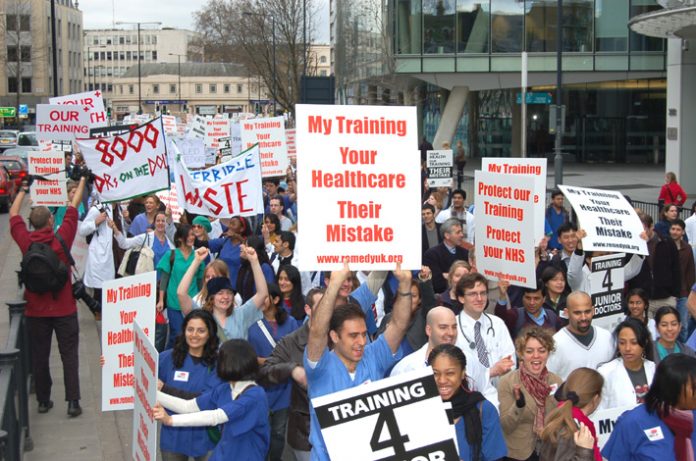
There is no good evidence that independent sector treatment centres have provided additional capacity, value for money, or high quality care, argue researchers in this week’s British Medical Journal (BMJ).
Despite this, says the BMJ, the government is continuing with the programme.
Commenting on the paper, Dr Jonathan Fielden, chairman of the BMA’s Consultants Committee, said: ‘This paper adds to criticisms from the Public Accounts Committee and the Healthcare Commission relating to the quality and cost effectiveness of these centres.
‘We have repeatedly raised concerns that this is £5 billion wasted on ideology rather than evidence.
‘The government seems to have been charmed by the private sector, but is unable to prove its effectiveness or value for money.
‘The lack of integration and collaboration with local NHS services leads to fragmentation of care for patients, leaves the NHS picking up the pieces, and has a major impact on training future doctors – with long term consequences for the NHS.’
In the BMJ article, Professor Allyson Pollock and Sylvia Godden from the University of Edinburgh warn that this will contribute to NHS deficits, NHS service closure and staff redundancies.
The policy of the Department of Health in England is to use NHS funds to contract with for-profit multinational healthcare corporations to deliver clinical services, they explain.
Part of this policy is the £5bn independent (private) sector treatment centre programme, which over the course of two phases (waves) aims to provide extra capacity to the NHS and reduce waiting times for elective surgery.
Yet, four years into the programme, the Department of Health has not gathered adequate data to justify the policy, say the authors.
They reviewed the available data and evidence in terms of the programme’s objectives and found a worrying failure to collect and publish data on performance.
For example, data on the number of available and occupied beds are collected annually from NHS Trusts, but no such data are collected from independent sector treatment centres.
Without these data, it is impossible to assess the contribution that these centres make to capacity, productivity, or efficiency.
A recent report by the Healthcare Commission found that incomplete and poor quality admissions and outpatient data from independent sector treatment centres limited their ability to assess quality of care.
Furthermore, the first research on the quality of work undertaken by private centres, published in October 2005, stated that data were so variable in quality and so incomplete as to render ‘any attempt at commenting on trends and comparisons between schemes and with any external benchmarks, futile.’
The Royal College of Surgeons of England also reported ‘increasing evidence’ that these centres were unable to manage complications and patients were being readmitted to the NHS.
The failure on the part of the DoH to collect meaningful systematic data about quality of care heightens concerns about standards of care, write the authors.
Data on workforce, contract performance and finances are also lacking.
The government’s assurance that staff employed by the private sector in treatment centres would be ‘additional’ rather than parasitic upon the NHS has not been honoured.
It has reneged upon its original guarantees, so that more than a quarter of the staff employed by the private sector are NHS staff.
Furthermore there is growing evidence that NHS funds are being diverted to the private sector for services they have failed to provide under the contract, they warn.
The government’s failure to collect and publish meaningful relevant data on the productivity, performance, staffing and quality of private independent treatment centres, and its refusal to provide any data on their value for money is worrying, they say.
Professor Pollock cautions: ‘The policy of diverting scarce NHS funds into independent sector treatment centres is leading to fragmentation and financial instability and NHS beds and services are being closed to make way for the for-profit private sector.
‘Despite assurances by the secretary of state for health, Alan Johnson, the available evidence suggests that the private sector is profiting at the expense of patients, the public, and the NHS.’
l Amid global calls to end drug companies’ direct sponsorship of doctors’ education, this week’s BMJ reports on an investigation in Australia which reveals sponsor involvement in the education of thousands of general practitioners.
This weekend, a programme by the Australian Broadcasting Corporation will show that it is not uncommon for drug company sponsors to suggest speakers at sessions that are assumed by the thousands of general practitioners who attend them to be totally independent.
Drug industry representatives have confirmed that similar practices take place in the United Kingdom, where roughly half of all education for doctors is sponsored by drug companies, writes Ray Moynihan, honorary lecturer at the University of Newcastle in Australia.
He describes how leaked documents and emails from a range of sources show drug company sponsors having input into the selection of some speakers at seminars held in recent years, despite the fact that these have been aggressively sold to general practitioners in brochures claiming that ‘all content is independent of industry influence’.
The drug industry’s representative body Medicines Australia has confirmed that the practice of inviting input from sponsors into the selection of speakers is by no means uncommon.
Industry representatives in Australia and the UK strongly argue that, in the interests of transparency, doctors attending educational sessions should be fully and explicitly informed if sponsors have suggested speakers for these sessions.
Such a degree of disclosure could radically change perceptions of the content of accredited education, says Moynihan, which many doctors believe to be independent of sponsor influence.
The evidence, such as it is, tentatively indicates that the prescribing habits of doctors may be affected by attending sponsored educational events, albeit only in the short term.
Oversight of these educational events is currently a self-regulatory affair, and institutions seem uninterested in guaranteeing independence, argues Moynihan.